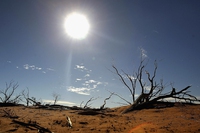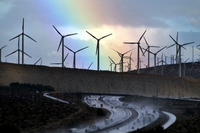
What could happen if we burn all the world’s fossil fuels
A Canadian study shows that if the world consumes all its reserves of oil, gas and coal, average temperatures would skyrocket.
A Canadian study shows that if the world consumes all its reserves of oil, gas and coal, average temperatures would skyrocket.
San Diego is a US city in Southern California, the last you come across before the border with Mexico. However, it’s likely to become the first – and the largest – US city to meet its 100 per cent renewable energy goal. The city council has recently signed unanimously the Climate Action Plan. The
107 ore di energia da fonti rinnovabili. Un record in tutta Europa. Il Portogallo in prima linea già dagli anni ’90.
È successo domenica scorsa quando, per qualche ora, i 55 GW di energia elettrica sui 58 consumati provenivano da fonti rinnovabili: solare, eolico ed idroelettrico.
Shuji Nakamura, premio Nobel per la Fisica, è stato a Como in occasione del Festival della Luce. L’inventore dei Led ha svelato a LifeGate come sarà la luce e l’energia del futuro.
Saudi Arabia is taking big steps towards post-oil era. With an unexpected decision, King Salman fired Saudi oil minister Ali al Naimi, who had held the post since 1995. The long-serving oil minister had planned the kingdom’s energy strategies for decades but he has now been replaced by Khaled al Falih, chairman of the state oil
Oltre cento super-petroliere sono bloccate al largo dei porti di tutto il mondo. Con duecento milioni di barili a bordo.
Survival International, a global movement for tribal peoples’ rights, has denounced mercury poisoning in Latin America in a letter to the UN Special Rapporteur for Health. The organisation highlights Venezuela, Peru and Brazil as countries that don’t comply with procedures to monitor the effects of mining on the environment. Mercury contamination, which commonly follows illegal
A frack free bake off in a land for gas extraction: that’s how the Thompson sisters criticise the Government energy policy with Greenpeace UK.
The Alberta tar sands hold much of Canada’s oil wealth: the region contains an estimated 1.7 trillion barrels of bitumen oil. The size of this reserve makes it the third largest oil deposit in the world after Venezuela and Saudi Arabia. Yet despite this, the cost of extraction now outweighs the profit made per barrel.








